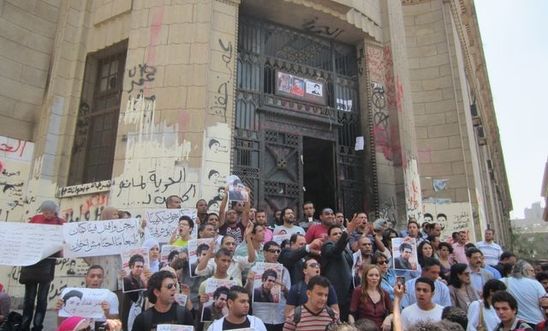
Press releases
Egypt: draconian counter-terrorism law would seriously undermine human rights

‘The counter-terrorism law is a clear knee-jerk reaction to consolidate the authorities’ iron grip on power’ - Said Boumedouha
A draconian counter-terrorism law expanding the Egyptian authorities’ “iron grip” on power would strike at the very heart of basic freedoms and human rights principles and must be scrapped immediately or fundamentally revised, said Amnesty International.
The draft law, which is under discussion by the Egyptian cabinet today, represents a flagrant attack on the rights to freedom of expression, peaceful assembly and association. It also weakens safeguards to ensure fair trials and widens the use of the death penalty. If approved the law could be signed off by the president and ratified within days.
In its current form, the draft law grants sweeping powers to the Egyptian president. In the absence of an Egyptian parliament these powers are without oversight and the authority granted to the President is near absolute. The law also permits the authorities to take measures that would usually only be invoked during a state of emergency.
The draft counter-terrorism law was introduced by the country’s State Council shortly after the recent killing of the public prosecutor and a wave of deadly attacks in the North Sinai Peninsula which killed at least 17 members of the security forces.
Amnesty International Middle East and North Africa Deputy Director Said Boumedouha said:
“The counter-terrorism law is a clear knee-jerk reaction to consolidate the authorities’ iron grip on power in order to counter recent security threats.“One of the key reasons the Egyptian people took to the streets in 2011 was to abolish the 30-year-long state of emergency imposed by Hosni Mubarak. Granting the current president similar absolute powers is a deadly blow to human rights in Egypt.“If the law is adopted in its current form, it will have the potential to criminalise the legitimate exercise of human rights, including freedom of expression, association and peaceful assembly, posing a particular risk to journalists, bloggers, human rights defenders and others.“Hundreds of Egyptians have already been sentenced to death in Egypt after grossly unfair trials. The counter-terrorism law would see scores more at risk of execution after similarly egregious proceedings.”
‘Terrorist acts’
The draft law also expands the definition of what constitutes a “terrorist act” using broad parameters such as “disturbing public order and social peace”, “harming national unity and national economy”, and “impeding the application of the provisions of the constitution and national laws”. Thousands of people, including peaceful protesters, human rights activists and journalists are already languishing in Egypt’s prisons facing similar charges that include “disturbing public order and social peace” and “impeding the application of the laws”.
The law also establishes special terrorism courts to rule on “terrorist” offences and adds new offences to the list of those punishable by death. International standards clearly state that military or other special jurisdictions should not have the authority to impose the death penalty, and that the scope of its application should never be extended.
Terrorism courts are obliged under the draft law to expedite verdicts and limit appeals before the court of cassation. The appeals process previously took place in two stages, removing this provision would abolish a key fair trial guarantee for those convicted by these special courts and put hundreds of people at risk of execution after deeply flawed expedited proceedings. Seven men have been executed in Egypt in 2015 after grossly unfair trials including in special military courts.
Restrictions on journalists
The law also imposes severe restrictions on journalists and others reporting on “terrorist” attacks who include details or statistics that differ from those announced by the state. Those who do so could face at least two years in prison. The draft law would effectively ban journalists from collecting information from different sources, including eye witnesses and families, to challenge the government’s narrative. At least 18 journalists are already in detention on charges that include “broadcasting false information”, which is not a recognised under international law.